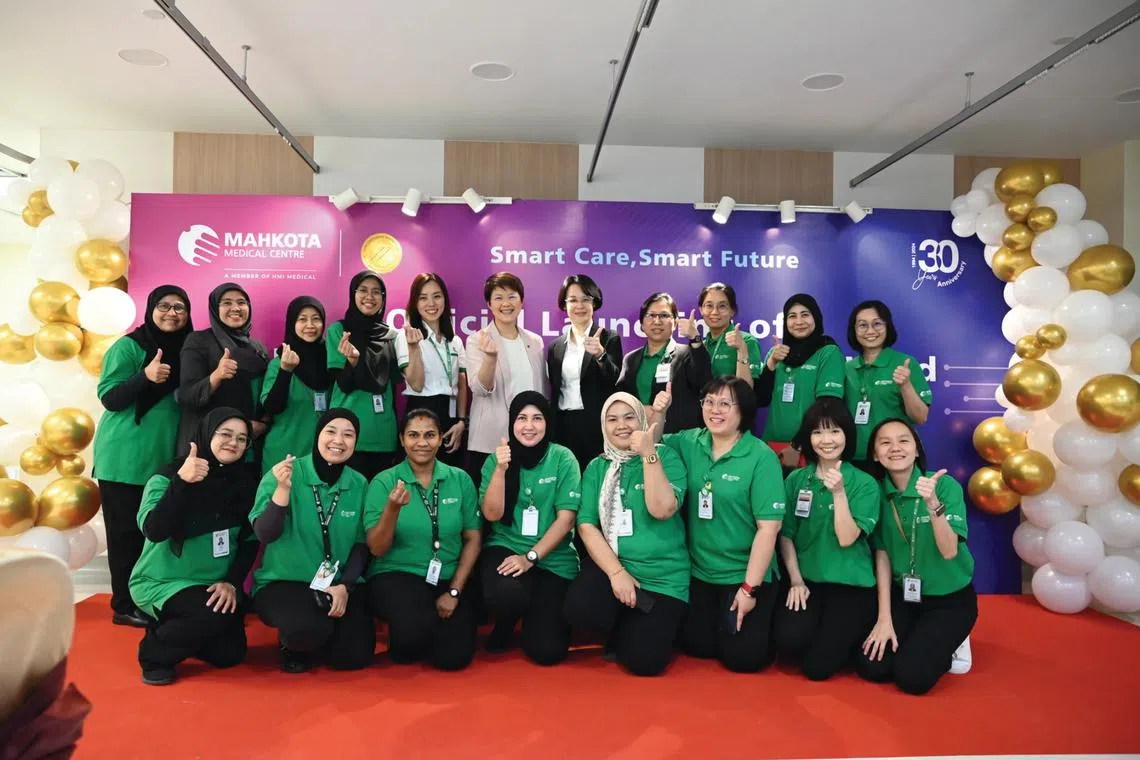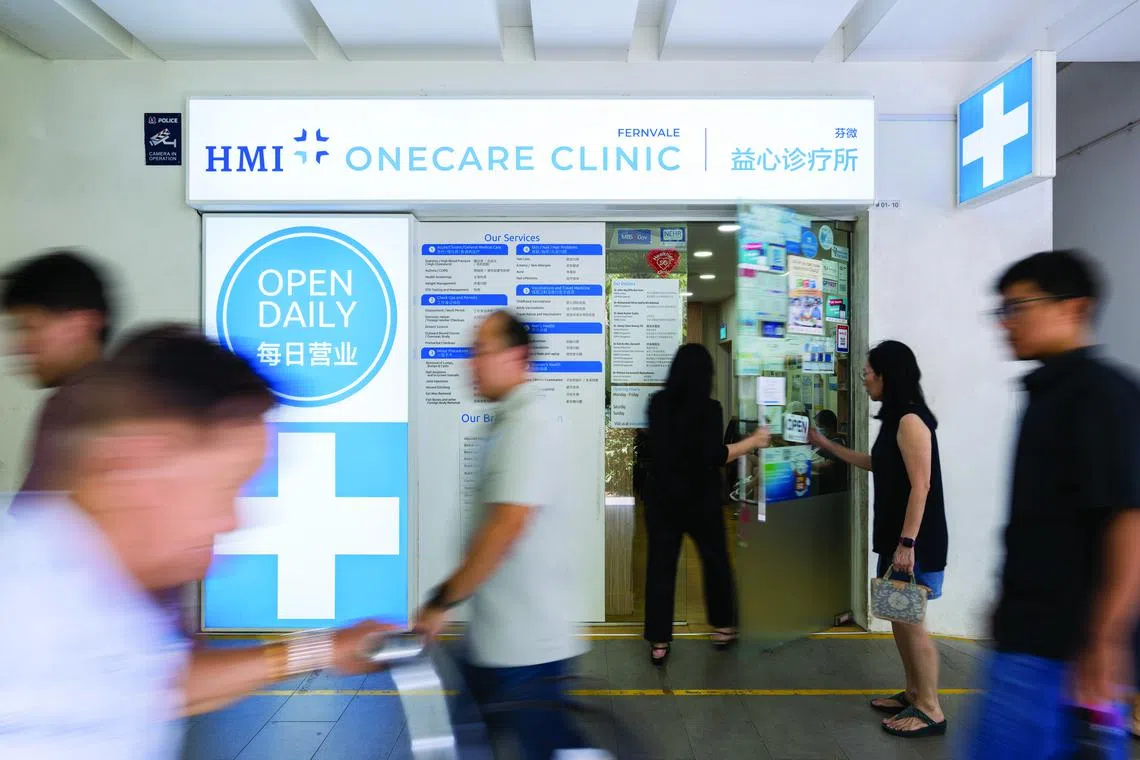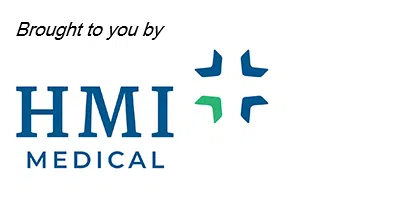HMI Medical sparks change with patient-centric care and innovative health solutions
HMI Medical has been busy building its ecosystem over 25 years, with significant advancements in recent years
Sign up now: Get ST's newsletters delivered to your inbox

Group CEO Chin Wei Jia (6th from the left) celebrates the launch of Malaysia’s first Next-Gen Smart Ward with management staff and nurses at Mahkota Medical Centre.
PHOTO: HMI
HOMEGROWN healthcare group HMI Medical is on a mission to help patients find the best options available to them as they navigate what can be a complex journey in matters of wellbeing.
In fact, its vision is to support everyone with access to health and wellness services throughout the entire health ecosystem. Today, HMI Medical’s health services comprises primary care clinics, health screening and diagnostic centres, specialist groups, medical centres, hospitals, as well as managed care services for corporates, with more than three million patient visits annually.
The determination to bring clear value to patients has motivated the group to grow aggressively in recent years so that it can continue to be more holistic in providing greater access to healthcare and wellness care services inside and outside of hospitals – to homes, in workplaces and within communities. Now, it is focused on prevention and early detection in healthcare journeys, because as its group chief executive officer (CEO) Chin Wei Jia says, “Healthcare is more than just patient care, and there’s a lot more that we can do ahead of the curve for people before they become patients.”
Chin, who took over as group CEO in late 2015, says a key to achieving a seamless, affordable and convenient experience for patients of different backgrounds is to work collaboratively across public, private and even not-for-profit healthcare entities. “If it’s a subsidised patient coming in, we want to help them navigate to the best option for them. If it’s an employee coming in and they’re looking for certain solutions, we’re able to share with them what are the best options and navigate through their own benefits so that they can receive that care in a very quick time,” she says. She further adds that it is important that patients are seen at the right time and right place, so that costs are commensurate to the care setting.
Delivering value-based healthcare to all
HMI Medical has been busy building its ecosystem for over 25 years, with significant advancements in recent years. In 2018, it acquired a majority stake in OneCare Medical and grew it into a nationwide chain of close to 40 HMI OneCare clinics today. This investment is about bringing care into the heartlands, closer to the community, says Chin, who adds that the clinics are open for extended hours so that it is more convenient for people who work shifts. Through these clinics, the group works closely with the Ministry of Health and other industry partners to make healthcare more accessible to everyone.

HMI OneCare Clinic is one of the largest private GP networks in Singapore and aims to strengthen the health of communities islandwide by making primary healthcare services more accessible to everyone.
“Once we have that first point of contact, we know what they need. We’re able to help them navigate through their healthcare journey, whether it’s a Healthier SG journey, or whether it’s referrals into the public healthcare system or even giving them other private options because a lot of people in Singapore do have personal insurance coverage or employee health benefits,” says Chin.
To offer highly personalised patient journeys, the group went on to broaden its specialist service offerings. Between 2022 and 2024, it acquired majority stakes in leading specialist groups, from Singapore’s largest private ophthalmology group, Eagle Eye Centre, to a leading private cardiovascular group, Harley Street Heart and Vascular Centre, and the largest private urology group, Advanced Urology Associates. The group has also seeded and started new specialist groups in orthopaedics and dermatology.
To better engage with and support more people seeking care, the group in 2023 acquired MHC Asia, an established medical benefits administrator and healthcare platform with a network of more than 2,000 clinics and wellness providers, which was recently rebranded to HMI Managed Healthcare. Alongside this acquisition, the group further invested in and built its own technology team to create digital products meant to help people take charge of their health by supporting them in navigating the system as seamlessly and conveniently as possible. “What we’re building is the technology behind (our health ecosystem). There’s the front-facing part (for patients), but the bigger part is the development of a robust internal technology-driven system that enables us to make timely and appropriate referrals, and address any queries they may have in navigating their health,” says Chin.
As Chin puts it, the company has been building into different segments and in a way, disrupting themselves because “change is the only constant”.
Disrupting healthcare with alternative care models
The foresight was attributed to Chin’s mother, Dr Gan See Khem, who is currently executive chair and managing director of HMI Medical. In fact, the Asian financial crisis did not stop HMI Medical from going for a public listing on the Singapore Exchange in 1999. For the first 20 years of its history, the group was very much focused on hospitals, as owner and operator. HMI Medical has roots in HMI Balestier Hospital that was set up by a group of local doctors in 1991, which was later converted to the HMI Institute of Health Sciences to equip people with healthcare knowledge and skills to join the healthcare profession.
In 1998, it acquired a stake and a five-year management contract in a 300-bed Mahkota Medical Centre in Malacca that was loss-making, but the hospital reversed its fortunes in just three years after restructuring and is now a leading hospital in Malaysia with an ongoing commitment to raising the bar of excellence in delivering exceptional end-to-end services to local and international patients.
“In fact, we are the first and currently still the only private hospital provider with JCI CCPC (Joint Commission International Clinical Care Programme Certification). What this means is that our team of doctors, nurses, and allied health are all working collaboratively to deliver consistent quality care to patients in different disciplines,” says Chin. The group continued to grow in the years that followed, acquiring a stake in 2007 in the 218-bed Regency Specialist Hospital in Johor, Malaysia, and moving to the SGX mainboard in 2008.
A decade later, HMI re-entered Singapore with its first investment in ambulatory care, now known as HMI Medical Centre, where day surgeries and procedures can be conducted outside of a hospital setting. “By having a business model that looked at what we could do efficiently and effectively, we drove down the cost of manpower, space and facilities. We focused on what can be done well and safely and done mostly minimally invasively in a setting that’s outside of the hospital,” Chin notes.
Moving ahead, Chin will be closely monitoring the Johor-Singapore Special Economic Zone and the RTS railway shuttle link between Singapore and Johor, as she expects more cross-border movements.
Cross-border healthcare demands on the rise
And with a fast-ageing population, in Malaysia and particularly in Singapore, such considerations are a necessity in the design of healthcare services to meet growing needs. Keeping these in mind, HMI Medical recently completed the Regency Specialist Hospital new hospital building extension in Johor, increasing its capacity to 500 beds. About six months ago, the group also launched Regency Medical Care Centre in Johor’s biggest mall, Mid Valley Southkey, to offer health screening and specialist outpatient services closer to the community.
Meanwhile, increasing costs and talent shortage will continue to challenge the healthcare industry here and globally. The silver lining is that new technology has not only enabled much better healthcare outcomes but also improved workflows. Earlier in 2025, the group launched its proprietary and fully customised “Smart Ward” workflow system at its hospitals that allows nurses and doctors to know in real time what each patient requires and when each task is completed.
Beyond the daily operations, it is also HMI’s mandate to give back to the community.

HMI Group CEO Chin Wei Jia hands out goodie bags to residents at a recent HMI Cares Better Health Better Life community health outreach event.
After joining HMI in 2002, Chin was part of the team that started the HMI Institute, which turned out to be her first project. She also spearheaded the conversion of HMI Institute into a social enterprise in 2019, strengthening the group’s social mission to “together, building a healthier society”.
“We have programmes that we are fully committed to, to train as many home-based caregivers or first responders as possible, because things happen outside of a healthcare system. And it’s extremely important with the ageing population,” says Chin.
As opposed to being at a loss, she says such training gives people the confidence to step up and help and is something “we need as a nation”.
Timeline
1991: 62-bed hospital Balestier Medical Centre is set up and later renamed under the HMI brand.
1998: HMI Medical is incorporated and expands into Malaysia in 1998 after acquiring a stake and a five-year management contract in a 300-bed Mahkota Medical Centre in Malacca.
1999: HMI Medical, with the core business of managing Balestier Medical Centre and Mahkota Medical Centre, becomes listed on the Singapore Exchange.
2002: HMI Institute of Health Sciences (HMI Institute) is launched to provide healthcare education and healthcare career placements.
2005: The group completes the conversion of HMI Balestier Hospital into the HMI Institute.
2007: HMI acquires Regency Specialist Hospital in Johor, and launched the 218-bed hospital in 2009 to tap Malaysia’s growing healthcare market.
2018: The group re-enters Singapore’s healthcare scene with a new 30,000-square-foot ambulatory care centre within HMI Medical Centre at Farrer Park. In the same year, HMI invests in OneCare Medical Group (now known as HMI OneCare Clinic) and expanded this into a nationwide chain of close to 40 clinics today.

2019: HMI delisted from the SGX. In the same year, HMI Institute transforms into a social enterprise to further contribute to healthcare and community health education and training.
2020: HMI Medical and staff got together to help fight the Covid-19 pandemic in Singapore and in Malaysia. At the same time, the construction piling works of a 300-bed extension at Regency began.
2021: The group acquires a majority stake in Eagle Eye Centre to focus on dedicated specialist care services.
2023: HMI Medical acquires MHC Asia Group (now known as HMI Managed Healthcare), a leading medical benefits administrator and healthcare technology platform in Singapore with a network of more than 2,000 panel clinics and wellness providers. In the same year, HMI acquired a majority stake in Harley Street Heart and Vascular Centre to focus on cardiovascular care and offer more specialist care pathways within HMI Medical’s growing health ecosystem.
2024: HMI launches HMI One app to bring added convenience to patients. In the same year, HMI acquires a majority stake in Advanced Urology Associates to expand its specialist service offerings.
2025: Regency Specialist Hospital completes its new hospital building extension.



